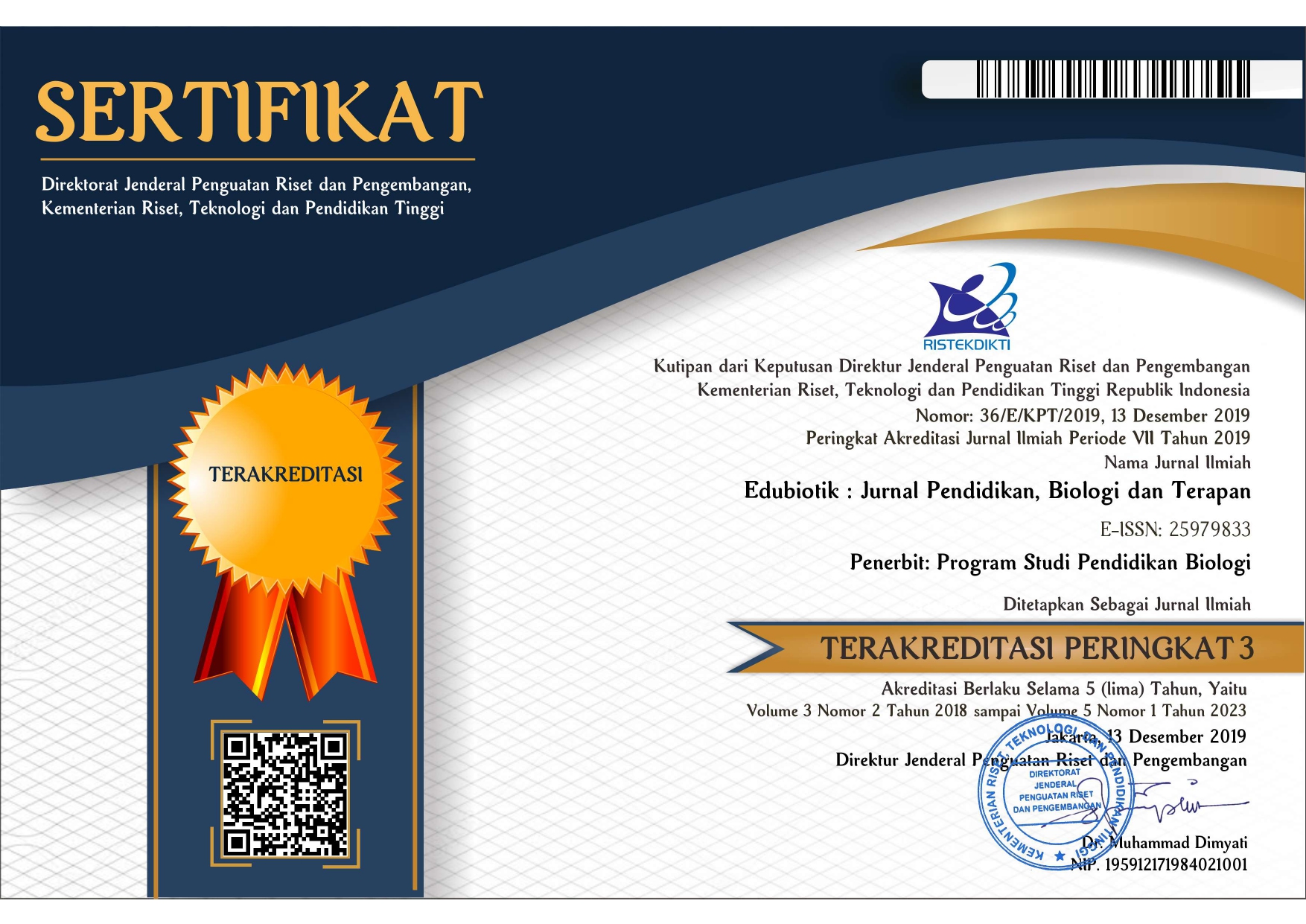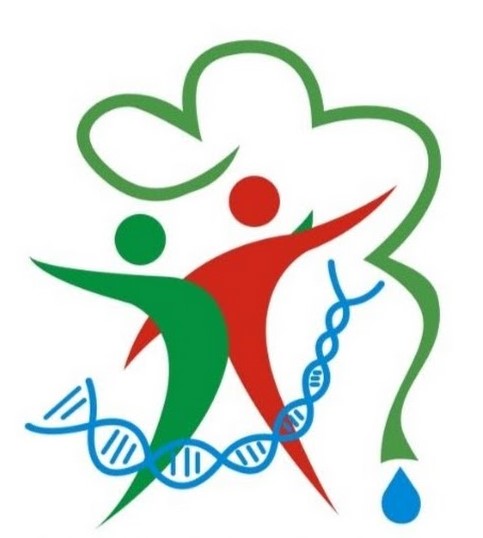Analysis of the correlation between critical thinking and metacognitive skills of senior high school students in biology Jeneponto Regency, South Sulawesi, Indonesia
Abstract
There is a need to map the connection between critical thinking and metacognitive skills of high school students so that educators can determine learning steps to help students obtain optimal learning outcomes and 21st-century skills. The research objective is to Examine the relationship between high school biology students' metacognitive abilities and critical thinking education. It is a quantitative-correlational study. The research sample was 230 grade XI students pursuing science specialization obtained by purposive random sampling from Jeneponto Regency, South Sulawesi, Indonesia. The research instrument used is an examination formatted as an essay that has been confirmed by professionals. The research data is the value of critical thinking and metacognitive skills from the results of taking tests in the form of essays. The method of data analysis was used through linear regression analysis using SPSS 23 for Windows. The study's findings indicate a strong correlation between critical thinking and metacognitive abilities of high school students in biology education with a significance value of 0.000 (p ˂ 0.05). It can be seen that critical thinking skills contribute 68.6% to students' metacognitive skills. Therefore, this research finds that there is a substantial correlation between high school biology students' metacognitive abilities and critical thinking. Teachers can use the research findings to identify instructional strategies that foster critical thinking in order to help students become more independent and metacognitive.
References
Adiansyah, R., Corebima, A. D., Zubaidah, S., & Rohman, F. (2021). The correlation between metacognitive skills and scientific attitudes towards the retention of male and female students in South Sulawesi, Indonesia. International Journal of Evaluation and Research in Education, 10(4), 1272–1281. https://doi.org/10.11591/IJERE.V10I4.21597
Alkharusi, H. A., Sulaimani, H. Al, & Neisler, O. (2019). Predicting critical thinking ability of Sultan Qaboos University students. International Journal of Instruction, 12(2), 491–504. https://doi.org/10.29333/iji.2019.12231a
Amin, A. M., Corebima, A. D., Zubaidah, S., & Mahanal, S. (2020). The correlation between metacognitive skills and critical thinking skills at the implementation of four different learning strategies in animal physiology lectures. European Journal of Educational Research, 9(1), 143–163. https://doi.org/10.12973/eu-jer.9.1.143
Andriana, A., Zubaidah, Z., Mahanal, S., & Suarsini, E. 2019. Incorporating remap-stad into learning cycle 5e to improve preservice biology teachers’ critical thinking skills. ICEMT’19: Proceedings of the 3rd International Conference on Education and Multimedia Technology, 114-119. https://doi.org/10.1145/3345120.3345140
Anthonysamy, L. (2021). The use of metacognitive strategies for undisrupted online learning: Preparing university students in the age of pandemic. Education and Information Technologies, 26(6), 6881–6899. https://doi.org/10.1007/s10639-021-10518-y
Arslan, S. (2012). The influence of environment education on critical thinking and environmental attitude. Journal Procedia, 55, 902-909. https://doi.org/10.1016/j.sbspro.2012.09.579
Azrai, E. P., Suryanda, A., Wulaningsih, R. D., & Sumiyati, U. K. (2020). Kemampuan berpikir kritis dan literasi sains siswa SMA di Jakarta Timur. Edusains, 12(1), 89–97. https://doi.org/10.15408/es.v12i1.13671
Bryce, D., Whitebread, D., & Szűcs, D. (2015). The relationships among executive functions, metacognitive skills and educational achievement in 5 and 7 year-old children. Metacognition and Learning, 10(2), 181–198. https://doi.org/10.1007/s11409-014-9120-4
Buku, M. N. I., Corebima, A. D., & Rohman, F. (2016). The correlation between metacognitive skills and the critical thinking skills of the senior high school students in biology learning through the implementation of problem based learning (PBL) in Malang, Indonesia. International Journal of Academic Research and Development, 1(5), 58–63. https://www.researchgate.net/
Corebima, A. D. (2009). Metacognitive skills measurement integrated in achievement test. Third International Conference on Science and Mathematics Education (CosMed). 10-12 November, 2009, Penang, Malaysia.
Dang, N. V., Chiang, J. C., Brown, H. M., & McDonald, K. K. (2018). Curricular activities that promote metacognitive skills impact lower-performing students in an introductory biology course. Journal of Microbiology & Biology Education, 19(1), 1–9. https://doi.org/10.1128/jmbe.v19i1.1324
Darmawan, E., Zubaidah, S., Ristanto, R. H., Zamzami, M. R. A., & Wahono, B. (2020). Simas eric learning model (SELM): Enhance student’ metacognitive skill based on the academic level. International Journal of Instruction, 13(4), 623–642. https://doi.org/10.29333/iji.2020.13439a
Ennis, R. H. (2011). The Nature of Critical Thinking: An Outline of Critical Thinking Dispositions and Abilities. University of Illinois. https://education.illinois.edu/
Fauzi, A., & Sa’diyah, W. (2019). Students’ metacognitive skills from the viewpoint of answering biological questions: Is it already good?. Jurnal Pendidikan IPA Indonesia, 8(3), 317–327. https://journal.unnes.ac.id/nju/index.php/jpii/article/view/19457
Fitriani, H., Asy’ari, M. Zubaidah., S., & Mahanl, S. (2018). Critical thinking disposition of prospective science teachers at IKIP Mataram, Indonesia. Journal of physics: Conference Series, 1108.102091. https://doi.org/10.1088/1742-6596/1108/1/012091
Hakim, M. F. Al, Sariyatun, S., & Sudiyanto, S. (2018). Constructing student`s critical thinking skill through discovery learning model and contextual teaching and learning model as solution of problems in learning history. International Journal of Multicultural and Multireligious Understanding, 5(4), 175. https://doi.org/10.18415/ijmmu.v5i4.240
Herlina, M., & Syahfitri, J. (2022). Effectiveness of learning and motivation to use google classroom on critical thinking skills. Edubiotik: Jurnal Pendidikan, Biologi dan Terapan, 7(1), 1-8. . https://doi.org/10.33503/ebio.v7i01.1373
Hartman, H.J. (2001). Developing students’ metacognitive knowledge and skills. In: Hartman, H.J. (eds) Metacognition in Learning and Instruction. Neuropsychology and Cognition, vol 19. Springer, Dordrecht. https://doi.org/10.1007/978-94-017-2243-8_3
Hyytinen, H., Ursin, J., Silvennoinen, K., Kleemola, K., & Toom, A. (2021). The dynamic relationship between response processes and self-regulation in critical thinking assessments. Studies in Educational Evaluation, 71, 101090. https://doi.org/10.1016/j.stueduc.2021.101090
Jia, X., Li, W., & Cao, L. (2019). The role of metacognitive components in creative thinking. Frontiers in Psychology, 10(2404), 1–11. https://doi.org/10.3389/fpsyg.2019.02404
Kondakçi, E. U., & Aydin, Y. Ç. (2013). Predicting critical thinking skills of university students through metacognitive self-regulation skills and chemistry self-efficacy. Educational Sciences: Theory & Practice, 13(1), 666–670. https://eric.ed.gov/
Kozikoglu, I. (2019). Investigating critical thinking in prospective teachers: Metacognitive skills, problem solving skills and academic self-efficacy. Journal of Social Studies Education Research, 10(2), 111–130. https://jsser.org/index.php/jsser/article/view/362
Kurniyasari, H., Hidayat, S., & Harfian, B. A. A. (2019). Analisis keterampilan berpikir kritis siswa SMA di kecamatan sako dan alang-alang lebar. Bioma : Jurnal Biologi Dan Pembelajaran Biologi, 4(1), 1–15. http://dx.doi.org/10.32528/bioma.v4i1.2646
Kusaka, S. (2022). Metacognitive strategies of Rwandan primary school students solving mathematical word problems. Electronic Record Of, 1–19. https://doi.org/10.1007/s43545-022-00495-5
Lajoie, S. P. (2008). Metacognition, self regulation, and self-regulated learning: A rose by any other name? Educational Psychology Review, 20(4), 469–475. https://doi.org/10.1007/s10648-008-9088-1
Laar, E. van, Deursen, A. J. A. M. van, Dijk, J. A. G. M. van, & Haan, J. de. (2020). Determinants of 21st-century skills and 21st-century digital skills for workers: A systematic literature review. SAGE Open, 10(1), 2158244019900176. https://doi.org/10.1177/2158244019900176
Lukitasari, M., Hasan, R., & Murtafiah, W. (2019). Using critical analysis to develop metacognitive ability and critical thinking skills in biology. JPBI (Jurnal Pendidikan Biologi Indonesia), 5(1), 151–158. https://ejournal.umm.ac.id/index.php/jpbi/article/view/7262
Luzyawati, L. (2017). Analisis kemampuan berpikir kritis siswa SMA materi alat indera melalui model pembelajaran inquiry pictorial riddle. EduSains: Jurnal Pendidikan Sains & Matematika, 5(2), 9–21.
Magno, C. (2010). The role of metacognitive skills in developing critical thinking. Metacognition and Learning, 5(2), 137–156. https://doi.org/10.1007/s11409-010-9054-4
Malahayati, E. N, Corebima, A. D, & Zubaidah, S. 2014. Hubungan keterampilan metakognitif dan kemampuan berpikir kritis dengan hasil belajar biologi siswa yang menjalani pembelajaran problem based learning (pbl) pada kelas xi SMA di kota Malang. Jurnal Pendidikan Sains, 3(4). https://journal.um.ac.id/index.php/jps/article/view/8168
Medina, M. S., Castleberry, A. N., & Persky, A. M. (2017). Strategies for improving learner metacognition in health professional education. American Journal of Pharmaceutical Education, 81(4), 1–14. https://doi.org/10.5688/ajpe81478
Miharja, F. J., Hindun, I., & Fauzi, A. (2019). Critical thinking, metacognitive skills, and cognitive learning outcomes: A correlation study in genetic. Biosfer: Jurnal Pendidkan Biologi, 12(2), 135–143. https://doi.org/10.21009/biosferjpb.v12n2.135-143
Mislia, T. S., Indartono, S., & Mallisa, V. (2019). Improving critical thinking among junior high school students through assessment of higher level thinking skills. Advances in Social Science, Education and Humanities Research, 323(ICoSSCE 2018), 326–333. https://doi.org/10.2991/icossce-icsmc-18.2019.58
Mustajab, W., Hadi Senen, S., & Waspada, I. (2018). Analisis kemampuan berpikir kritis siswa SMA pada materi koperasi. OIKOS Jurnal Kajian Pendidikan Ekonomi Dan Ilmu Ekonomi, VIII, 9–16. https://doi.org/10.23969/oikos.v2i1.920
Naimnule, L., & Aloysius, D. C. (2018). The correlation between metacognitive skills and the critical thinking skills of the senior high school students in biology. Journal of Pedagogical Research (JPR), 2(2), 122–134. https://www.ijopr.com/download/the-correlation-between-metacognitive-skills-and-critical-thinking-skills-toward-students-process-6384.pdf
Perdani, W. S. R., Santosa, S., & Ramli, M. (2019). Peningkatan kemampuan berpikir kritis siswa SMA dengan model inkuiri pada materi sistem indera. Bio-Pedagogi, 8(1), 52. https://doi.org/10.20961/bio-pedagogi.v8i1.35551
Phan, H. P. (2010). Critical thinking as a self-regulatory process. Psicothema, 22(2), 284-292. https://www.redalyc.org/pdf/727/72712496017.pdf
Purwanto, A., Rahmawati, Y., Rahmayanti, N., Mardiah, A., & Amalia, R. (2022). Socio-critical and problem-oriented approach in environmental issues for students’ critical thinking skills development in chemistry learning. In Journal of Technology and Science Education (Vol. 12, Issue 1, pp. 50–67). https://doi.org/10.3926/jotse.1341
Rahayu, D. N. G., Harijanto, A., & Lesmono, A. D. (2018). Tingkat kemampuan berpikir kritis siswa SMA pada materi fluida dinamis. Jurnal Pembelajaran Fisika, 7(2), 162–167. https://jurnal.unej.ac.id/index.php/JPF/article/view/7923
Rahimi, M., & Katal, M. (2012). Metacognitive strategies awareness and success in learning english as a foreign language: An overview. Procedia - Social and Behavioral Sciences, 31(2011), 73–81. https://doi.org/10.1016/j.sbspro.2011.12.019
Ramadhanti, D., Ghazali, A. S., Hasanah, M., & Harsiati, T. (2019). Students’ metacognitive weaknesses in academic writing: A preliminary research. International Journal of Emerging Technologies in Learning, 14(11), 41–57. https://doi.org/10.3991/IJET.V14I11.10213
Rivas, S. F., Saiz, C., & Ossa, C. (2022). Metacognitive strategies and development of critical thinking in higher education. Frontiers in Psychology, 13(June), 1–13. https://doi.org/10.3389/fpsyg.2022.913219
Rosdiana, S. R., Sutopo, S., & Kusairi, S. (2019). Kemampuan berpikir kritis siswa SMA pada materi fluida statis. Jurnal Pendidikan: Teori, Penelitian, Dan Pengembangan, 4(6), 731. https://doi.org/10.17977/jptpp.v4i6.12484
Sarıcoban, A. (2015). Metacognitive Awareness of pre-service english language teachers in terms of various variables. Procedia - Social and Behavioral Sciences, 186(2007), 664–669. https://doi.org/10.1016/j.sbspro.2015.04.135
Sofiyana, M., & Sholihah, M. (2022). An analysis of preservice teachers critical thinking skills at Universitas Islam Blitar. Edubiotik: Jurnal Pendidikan, Biologi dan Terapan, 7(2), 122-128. https://doi.org/10.33503/ebio.v7i02.1902
Shannon, S. (2008). Using metacognitive strategies and learning styles to create self-directed learners. Institute for Learning Styles Journal, 1(2001), 14–28. https://www.auburn.edu/
Stanton, J. D., Sebesta, A. J., & Dunlosky, J. (2021). Fostering metacognition to support student learning and performance. CBE Life Sciences Education, 20(2), 1–7. https://doi.org/10.1187/cbe.20-12-0289
Sudirman, S., & Yusnaeni, Y. (2020). Students’ metacognitive and critical thinking skills in thermochemistry. JTK (Jurnal Tadris Kimiya), 5(2), 242–251. https://doi.org/10.15575/jtk.v5i2.9616
Susilawati, E., Agustinasari, A., Samsudin, A., & Siahaan, P. (2020). Analisis tingkat keterampilan berpikir kritis siswa SMA. Jurnal Pendidikan Fisika Dan Teknologi, 6(1), 11–16. https://doi.org/10.29303/jpft.v6i1.1453
Tao, A., & Li, Xi. (2014). Relationship between critical thinking and personality based on the history of psychology teaching. American International Journal of Social Science, 3(5), 88–93. https://www.aijssnet.com/journals/Vol_3_No_5_October_2014/9.pdf
Tuysuzoglu, B. B., & Greene, J. A. (2014). An investigation of the role of contingent metacognitive behavior in self-regulated learning. Metacognition Learning, 10(11), 77–98. https://doi.org/10.1007/s11409-014-9126-y
Uppal, N., & Kumar, A. (2020). Metacognition: A key determinant of self-regulated learning. Shodh Sanchar Bulletin, 10(40), 101–105. https://www.researchgate.net/
Wale, B. D., & Bishaw, K. S. (2020). Effects of using inquiry-based learning on EFL students’ critical thinking skills. Asian-Pacific Journal of Second and Foreign Language Education, 5(1), 9. https://doi.org/10.1186/s40862-020-00090-2
Wibowo, L. A., Sihaloho, L., & Rahayu, A. (2018a). The role of self efficacy in improving student metacognitive skills. Jurnal Pendidikan Bisnis Dan Manajemen, 4(3), 130–141. https://doi.org/10.17977/um003v4i32018p130
Wicaksono, C. G. A., & Corebima, A. D. (2015). Hubungan antara keterampilan metakognitif dan retensi siswa dalam strategi pembelajaran reciprocal teaching dipadu Jigsaw d ikelas X SMAN 7 Malang. Bioma, 4(1). https://journal.upgris.ac.id/index.php/bioma/article/view/947
Wijayanti, R., & Siswanto, J. (2020). Profil kemampuan berpikir kritis siswa sma pada materi sumber-sumber energi. Jurnal Penelitian Pembelajaran Fisika, 11(1), 109–113. https://doi.org/10.26877/jp2f.v11i1.5533
Yusmar, F., Nisa, A., Wahyuni, S., Wahyuni, D., & Fadila, R. (2022). Development of sets-based science e-module to improve critical thinking skills of grade viii students on additive and addictive subtances material. Edubiotik: Jurnal Pendidikan, Biologi dan Terapan, 7(2), 93-106. https://doi.org/10.33503/ebio.v7i02.2004
Zubaidah, S., Corebima, A. D., Mahanal, S., & Mistianah. (2018). Revealing the relationship between reading interest and critical thinking skills through remap GI and remap jigsaw. International Journal of Instruction, 11(2), 41–56. https://doi.org/10.12973/iji.2018.1124a





.png)
2.png)

1.jpg)


